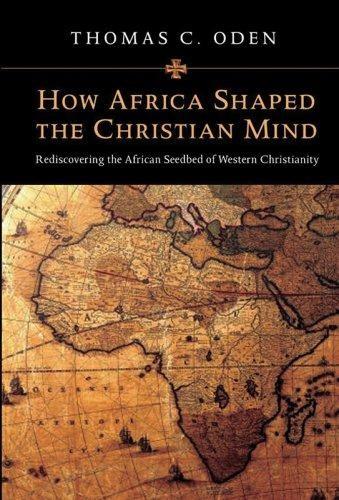
How Africa Shaped the Christian Mind: Rediscovering the African Seedbed of Western Christianity PDF
Preview How Africa Shaped the Christian Mind: Rediscovering the African Seedbed of Western Christianity
Africa has played a decisive role in the formation of Christian culture from its infancy. Some of the most decisive intellectual achievements of Christianity were explored and understood in Africa before they were in Europe.
If this is so, why is Christianity so often perceived in Africa as a Western colonial import? How can Christians in Northern and sub-Saharan Africa, indeed, how can Christians throughout the world, rediscover and learn from this ancient heritage?
Theologian Thomas C. Oden offers a portrait that challenges prevailing notions of the intellectual development of Christianity from its early roots to its modern expressions. The pattern, he suggests, is not from north to south from Europe to Africa, but the other way around. He then makes an impassioned plea to uncover the hard data and study in depth the vital role that early African Christians played in developing the modern university, maturing Christian exegesis of Scripture, shaping early Christian dogma, modeling conciliar patterns of ecumenical decision-making, stimulating early monasticism, developing Neoplatonism, and refining rhetorical and dialectical skills.
He calls for a wide-ranging research project to fill out the picture he sketches. It will require, he says, a generation of disciplined investigation, combining intensive language study with a risk-taking commitment to uncover the truth in potentially unreceptive environments. Oden envisions a dedicated consortium of scholars linked by computer technology and a common commitment that will seek to shape not only the scholar's understanding but the ordinary African Christian's self-perception.
From Publishers WeeklyWhere is the cradle of Christianity—Europe or Africa? After teaching historical and systematic theology, Oden is surprisingly just discovering what other scholars have argued for some time: that the earliest contours of Christianity can be easily traced to Africa. After all, Origen, Clement of Alexandria, Tertullian, Plotinus and Augustine—to name only a few early Christian thinkers—were Africans. In this tiresome and repetitious book, Oden belabors the already well-established notion that Christianity's roots can be found in Africa. He does draw helpfully on his work on the Ancient Christian Commentary on Scripture series to demonstrate that the intellectual contours of Christianity—academics, exegesis, dogmatics, ecumenics, monasticism, philosophy, and dialectics—developed in Africa. However, Peter Brown (Augustine of Hippo) and other writers have clearly recognized this contribution, and Oden's naïve and hyperbolic book is more embarrassing than enlightening. Oden's study is most suited to those who are entirely new to the debate and who will benefit from resources such as a time line of early African Christianity and a reading list for further investigation of the subject. (Jan.)
Copyright © Reed Business Information, a division of Reed Elsevier Inc. All rights reserved.
"Rarely has a work of such brevity distilled so much vintage wisdom with such élan. How Africa Shaped the Christian Mind fills a crucial gap between the early church in Africa and Western Christianity, and represents a timely challenge to Christian Africans and to a post-Christian West. It will be impossible--and foolhardy-- to ignore this book." (Lamin Sanneh, Professor of World Christianity and of History, Yale University)
"How Africa Shaped the Christian Mind is a bold call to rehabilitate the earliest African contributions to the shaping of world Christianity. As such, it is a major resource for all people interested in the history of the Christian movement. Oden's focus on the intellectual dimension of Africans' role in the formation of Christian culture may surprise some, but it is a much-needed, welcome corrective to the assumptions held by many. In my opinion, this book is one of the most significant contributions to the literature on world Christianity. Must reading!" (Tite Tiénou, Dean and Professor of Theology of Mission Trinity Evangelical Divinity School)**
